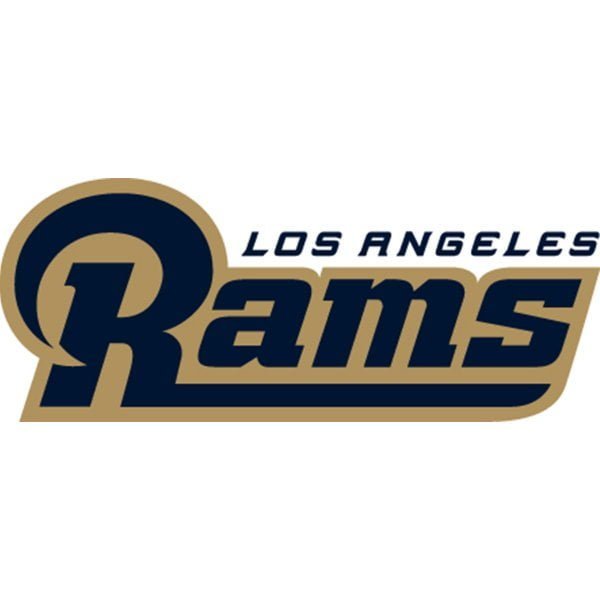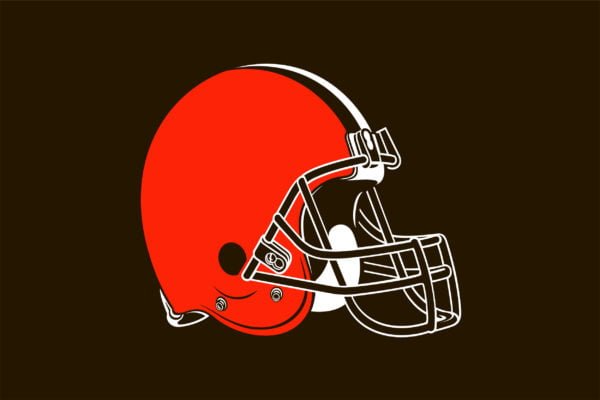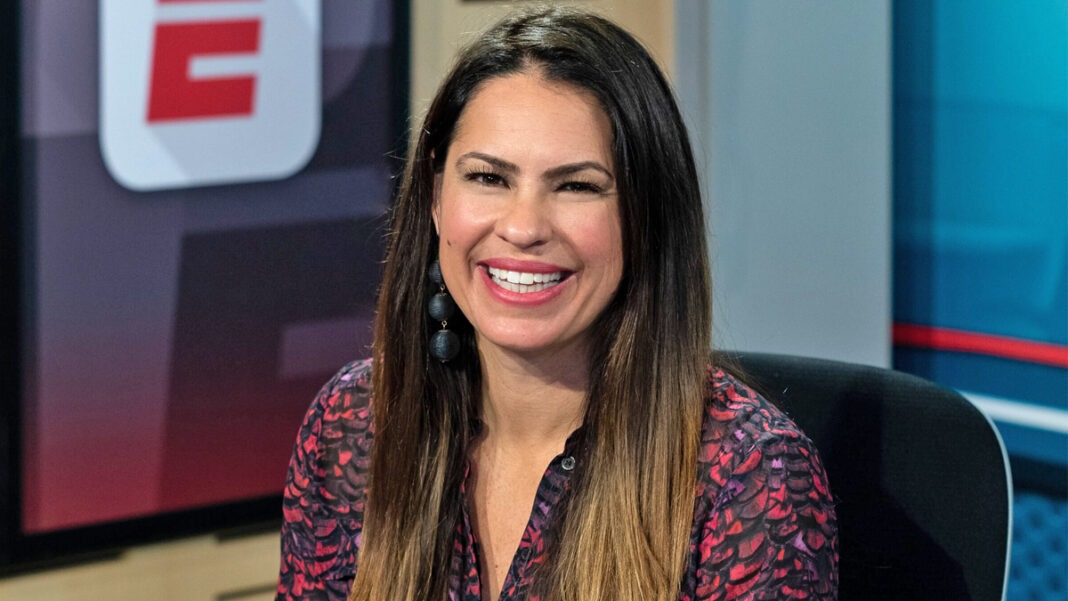On Tuesday night, the NFL owners voted to allow the St. Louis Rams to return to Los Angeles. Owner Stan Kroenke got his wish to bring football back to the nation’s 2nd largest market, and will now reap the financial benefits of a geographical change.
Although I’m excited for the people of Los Angeles to have an NFL team once again in their backyard, I’m sick to my stomach thinking about my friends in St. Louis who have now had the NFL punch them in the gut for the second time. St. Louisans invested themselves in supporting the team and its sponsors for the past 20 years, while raising their children to become fans of the team. But today they wake up to the reality that they’ll soon have no games to attend on Sunday when the next NFL season rolls around.
 Gone are the hopes and dreams of experiencing future Super Bowl championship parades down Market Street. Businesses who count on the team’s Sunday crowds will now suffer from their departure, and politicians in the show-me state will now have to show they’re committed to not letting this moment define them and their city.
Gone are the hopes and dreams of experiencing future Super Bowl championship parades down Market Street. Businesses who count on the team’s Sunday crowds will now suffer from their departure, and politicians in the show-me state will now have to show they’re committed to not letting this moment define them and their city.
Was it right? No. Was it fair? Absolutely not. But as cold and harsh as that might be, the NFL is a business. We lose sight of that when these situations arise because we sink our heart and soul into these franchises, only to discover later that the only true attachment they want from us is the one that includes access to our bank accounts.
I have no issue whatsoever with Los Angeles having a team. The NFL definitely should have a franchise there, and those fans who lost their teams 20 years ago, didn’t deserve that pain either. But I don’t believe you set a good precedent when you destroy the lives of a few million people in one city to make the lives of a few million others in another city better.
 It’s even more baffling when you consider how calculated this move was. Stan Kroenke bought the Rams in 2010 after Georgia Frontiere passed away. He held a minority stake in the club at that time and Georgia’s family had an interested buyer in Shahid Khan (now the owner of the Jacksonville Jaguars) who wanted to keep the team in St. Louis. Kroenke though exercised his right to match the bid and took over control of the franchise.
It’s even more baffling when you consider how calculated this move was. Stan Kroenke bought the Rams in 2010 after Georgia Frontiere passed away. He held a minority stake in the club at that time and Georgia’s family had an interested buyer in Shahid Khan (now the owner of the Jacksonville Jaguars) who wanted to keep the team in St. Louis. Kroenke though exercised his right to match the bid and took over control of the franchise.
When he assumed control he said “I’ve been around St. Louis and Missouri a major portion of my life. I’ve never had any desire to lead the charge out of St. Louis. That’s not why we’re here. We’re here to work very hard and be successful in St. Louis.”
But although that sounded good, his actions over the next 5+ years told a different story.
Kroenke started out by transferring his ownership of the Colorado Avalanche and Denver Nuggets to his son Josh who was 30 years old at the time. That was the loophole he explored so he could become owner of the Rams and maintain ownership of his existing teams. If you think “Silent Stan” was suddenly washing his hands with all business related to those two franchises you’re kidding yourself. But on paper, he covered his tracks.
Then he explored trying to buy the Los Angeles Dodgers in 2012. The winning bid went to Magic Johnson’s group but reports started to surface that Kroenke was interested in the Dodgers because he wanted to build his own media network, and after gaining the opportunity to move the Rams out of St. Louis and back to Los Angeles, offer their programming on a Kroenke owned channel.
This very model has been constructed in Denver with the addition of Altitude Sports. He’s also purchased a number of radio stations in Colorado and is expected to use one of those signals to further promote and sell content built around the Nuggets and Avalanche.
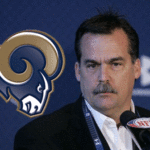 As Stan was investigating purchasing land and forging relationships with local politicians in California, the Rams product remained stagnant. He refused to show his face or speak publicly to calm the fears of local fans, and the only time he spoke on the record was when Jeff Fisher was hired as Head Coach. If you’re not looking to leave town, and ticket sales and advertising revenues are declining, you’d think it would make business sense to address the elephant in the room and help get your business back on track.
As Stan was investigating purchasing land and forging relationships with local politicians in California, the Rams product remained stagnant. He refused to show his face or speak publicly to calm the fears of local fans, and the only time he spoke on the record was when Jeff Fisher was hired as Head Coach. If you’re not looking to leave town, and ticket sales and advertising revenues are declining, you’d think it would make business sense to address the elephant in the room and help get your business back on track.
But that wasn’t going to happen.
In the NFL’s guidelines for relocation, it states that no team has an entitlement to relocate simply because it receives another opportunity to enhance club revenues in another location. Considering that St. Louis was the only one of the three cities with an actual stadium plan and commitment, it’s hard to understand how this relocation was anything but a money grab.
Roger Goodell and his people saw the dollar signs in Los Angeles along with a promise for a new home for their growing NFL Media empire and Stan was the guy with the deep pockets and huge grapefruits who was willing to turn his back on his home state to get it done. Jabs were thrown at the people in St. Louis for not offering more support, when in reality they were given every reason to not attach themselves to the team. Lost in all of this was the reality that the NFL saw Oakland and San Diego as being more lucrative.
 It’s easy for people in glass houses to throw stones and attack St. Louis fans for not attending games but when you’re handed a lemon of a product which delivers a 50-109-1 record over 10 years, and your owner won’t speak publicly about his intentions in your city, while he rubs elbows and furthers dialogue with Los Angeles leadership and explores every angle to leave (including attempting to break his lease to play more home games in London), it’s impossible to be supportive.
It’s easy for people in glass houses to throw stones and attack St. Louis fans for not attending games but when you’re handed a lemon of a product which delivers a 50-109-1 record over 10 years, and your owner won’t speak publicly about his intentions in your city, while he rubs elbows and furthers dialogue with Los Angeles leadership and explores every angle to leave (including attempting to break his lease to play more home games in London), it’s impossible to be supportive.
Bear in mind, the team didn’t reach the playoffs once during the previous 11 seasons, and if you look at their performance since Stan took over in 2010, they’re 36-59. They haven’t had one winning season under his ownership.
The issue here though was never about ticket sales. It was about the opportunity to increase his franchise value and own net worth by returning to Los Angeles. When you take into account the numerous business opportunities he gains from parking, to hotels, to restaurants, to higher rights deals, to possibly even gaining a tenant in the Chargers or Raiders, there’s a reason why Stan Kroenke is a multi-billionaire – he knows how to make money!
None the less, what’s done is done. The city of St. Louis and its great people will now have to pick themselves up off the ground, and decide how to repair the damage. One of my favorite quotes comes from William A. Ward and it says “Adversity causes some to break, others to break records“. St. Louis will have to decide if they’re going to let this moment break them, and if the past is any indication, I don’t believe they will.
So how does that translate to the sports media business? Here’s how.
 With the Rams leaving town, local people will further invest themselves in supporting the Cardinals and Blues. If you’re the team’s rights holders KMOX and Fox Sports Midwest, or any of the local sports stations (101 ESPN, CBS Sports 920, 590 The Fan KFNS), that’s good news. In moments like these, people tend to gravitate to those who love them back.
With the Rams leaving town, local people will further invest themselves in supporting the Cardinals and Blues. If you’re the team’s rights holders KMOX and Fox Sports Midwest, or any of the local sports stations (101 ESPN, CBS Sports 920, 590 The Fan KFNS), that’s good news. In moments like these, people tend to gravitate to those who love them back.
Because those other two local franchises have remained loyal and happy with their standing in the St. Louis community, I’d expect them both to benefit from it. Media outlets who put an even heavier focus into supporting them will be rewarded for it.
If you remember when the Los Angeles Angels announced they were signing Albert Pujols following the 2011 season, it was a dark day for St. Louis baseball fans. He was the face of the franchise, a good man, and he had won multiple MVP awards and a couple of World Series titles. His departure would’ve been the equivalent to New York losing Derek Jeter.
As painful and heartbreaking as it was for many, they stood behind their Cardinals. General Manager John Mozeliak went to work to rebuild the franchise, and as luck would have it, the Cardinals that season reached the playoffs and advanced to the NL Championship series where they lost in 7 games to the San Francisco Giants.
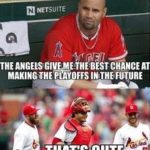 Meanwhile, Pujols’ Angels didn’t reach the post-season that season and they’ve only done so once during his 4 years in the city of Angels. Their only October visit resulted in a three game sweep courtesy of the Kansas City Royals in the first round of Wildcard play in 2014. During that same period, the Cardinals have advanced to the post-season every year.
Meanwhile, Pujols’ Angels didn’t reach the post-season that season and they’ve only done so once during his 4 years in the city of Angels. Their only October visit resulted in a three game sweep courtesy of the Kansas City Royals in the first round of Wildcard play in 2014. During that same period, the Cardinals have advanced to the post-season every year.
Another way I expect the city to rally is to further stand behind the media members of the community who stood up for them during this tumultuous time. Personalities like Bernie Miklasz, Randy Karraker, Kevin Wheeler, Frank Cusumano, Tim McKernan, and Howard Balzer have defended the local people and the city, while explaining why it remains vibrant and economically sound. They’ve not been afraid to challenge the NFL, its leaders and bylaws, and the Rams hierarchy, who were set on chasing the pot of gold that awaited them in Inglewood.
Today they may not feel their efforts made a difference because the team was given the green light to pack up and head West, but in taking the positions that they did, and putting every ounce of their energies into fighting for their team, city and people, they gained respect, and a deeper appreciation and loyalty from the local audience. That’s something that will mean much more down the road when they reflect back on who they were to their communities.
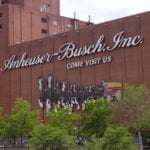 No matter how hollow the feeling might be, people in St. Louis will never forget how those media folks had their backs during the toughest of times. The one way fans can and will repay them, is by listening more to their shows, watching their TV programs, reading their website articles, and supporting their station’s advertisers. I’d also expect some local advertisers to ramp up their efforts and further invest in these people and brands because they recognize how important it is to do so during hard times like this.
No matter how hollow the feeling might be, people in St. Louis will never forget how those media folks had their backs during the toughest of times. The one way fans can and will repay them, is by listening more to their shows, watching their TV programs, reading their website articles, and supporting their station’s advertisers. I’d also expect some local advertisers to ramp up their efforts and further invest in these people and brands because they recognize how important it is to do so during hard times like this.
One issue that will need to be examined over the next year or two is whether or not four sports stations and two News/Talk brands with sports content and relationships can turn a profit in Market #22. It’s one thing to fill the airwaves with sports programming, but it’s another to be a financial success. I’m not sure if there are enough advertising dollars in the market to support all of those brands. I certainly hope that there are but it’s not going to be easy.
The last side of this conversation that I want to focus on is how it will impact the ratings side of the business. It goes without saying that the loss of a football team usually means less audience and lesser interest in sports talk programming Monday-Friday. Stations may explore adding an NFL affiliation with another team such as the Bears, Chiefs, Colts or Titans, but that isn’t going to make up for the loss of a local team. I’m not even sure yet if a St. Louis sports fan is going to want to hear anything about the NFL next Fall. There are still a few months between now and then so we’ll have to see how the healing process plays out.
That said, if you look around the country, there are plenty of markets that thrive despite not having a football franchise. They pledge their support to NBA, NHL and MLB teams, and in some smaller cities, college sports drives heavy listening. None of us are nostradamus and can predict whether St. Louis will receive another NFL team or capture the interest of the NBA, but for now, the focus for brands who operate Sports and News/Talk programming has to revolve around the people, franchises and universities who remain committed to staying there.
 Look at Nashville, Portland, Charlotte, Cincinnati, and Indianapolis. All of those cities have 2 pro teams or less and when you combine their college programs, there are plenty of sports options for people to sink their teeth into. Stations like The Fan in Charlotte, Portland and Indianapolis, and The Zone in Nashville, perform very well despite not having either an MLB, NBA or NFL franchise. As a matter of fact, The Zone is one of the top rated sports talkers in the country.
Look at Nashville, Portland, Charlotte, Cincinnati, and Indianapolis. All of those cities have 2 pro teams or less and when you combine their college programs, there are plenty of sports options for people to sink their teeth into. Stations like The Fan in Charlotte, Portland and Indianapolis, and The Zone in Nashville, perform very well despite not having either an MLB, NBA or NFL franchise. As a matter of fact, The Zone is one of the top rated sports talkers in the country.
However, there are less sports talk radio stations in those cities than there are in St. Louis. That’s something to be aware of.
As it applies to ratings and revenue, I’d rather lose 16 football games on Sunday than 162 regular season baseball games. Many of those games air M-F and can have a big impact on a station’s performance, depending of course on which team you’re aligned with.
Most radio operators prefer to feature their best talent M-F 6a-7p, and add play-by-play around them to provide a cume, marketing and advertiser boost. As long as lineups remain stable and of interest to the local market, there are plenty of other ways to add sponsor dollars, marketing awareness and cume increases.
 I’m not going to suggest that losing an NFL franchise doesn’t impact business. It definitely stings and will cause some of these brands to have to adjust their strategies and expectations. It also forces them to have to modify their image because you’re no longer a three sport town.
I’m not going to suggest that losing an NFL franchise doesn’t impact business. It definitely stings and will cause some of these brands to have to adjust their strategies and expectations. It also forces them to have to modify their image because you’re no longer a three sport town.
But if the things that matter most in our business are building and connecting with an audience, generating ratings, and utilizing high profile personalities, their ratings, and our access to people through our on-air, online, and social platforms to secure advertising dollars, then that still remains doable.
It may have to be done differently, and it will take time for the emotions to subside, but a media business in St. Louis can still prosper, and listeners will still seek out hearing local people talk about local sports subjects – with or without the Rams! Knowing the passion of those fans as I do, I expect them to become more supportive of the brands and people who remain there. If you don’t believe me, ask the Cardinals and Albert Pujols how this story ends. I’m sure they haven’t forgotten.

Jason Barrett is the President and Founder of Barrett Media since the company was created in September 2015. Prior to its arrival, JB served as a sports radio programmer, launching brands such as 95.7 The Game in San Francisco, and 101 ESPN in St. Louis. He also spent time programming SportsTalk 950 in Philadelphia, 590 The Fan KFNS in St. Louis, and ESPN 1340/1390 in Poughkeepsie, NY. Jason also worked on-air and behind the scenes in local radio at 101.5 WPDH, WTBQ 1110AM, and WPYX 106.5. He also spent two years on the national stage, producing radio shows for ESPN Radio in Bristol, CT. Among them included the Dan Patrick Show, and GameNight.
You can find JB on Twitter @SportsRadioPD. He’s also reachable by email at Jason@BarrettMedia.com.






